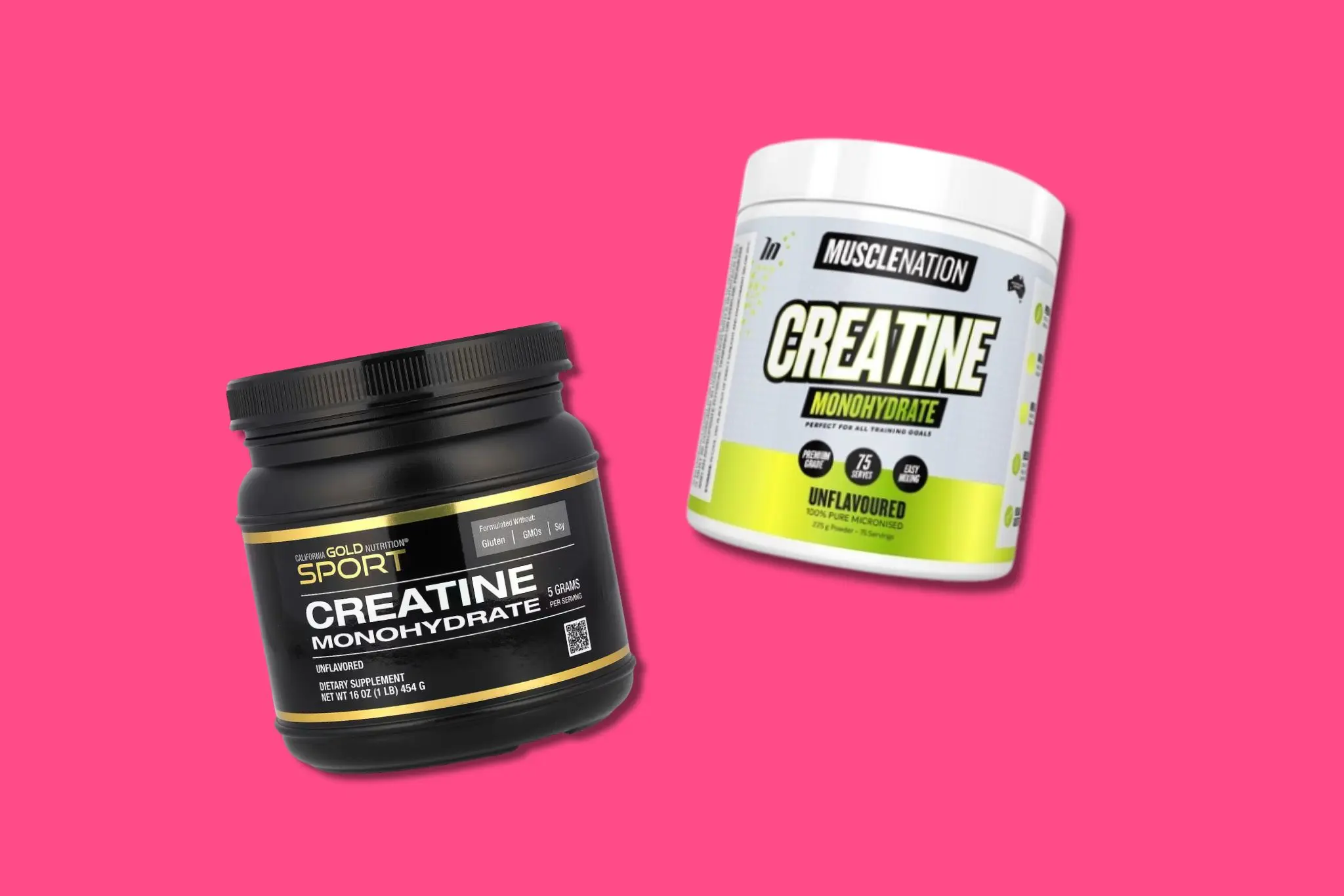What Does Creatine Do For Women? The Risks & Benefits
Creatine supplements are meant to add extra power and oomph to your exercise performance. But like any supplement, it’s important to know if the science matches the hype.

June 13, 2024 - Updated October 13, 2025

We may earn a commission for products purchased through links in this article.
When you start training at a challenging intensity or chasing ambitious fitness goals, it’s natural to look at your diet and wonder - is there anything I could be doing to give me an extra leg up? While whole foods should always be your first port of call to improve your nutrient intake, some supplements can make a big difference to your performance, recovery and progress. Creatine is one of them.
What is creatine?
According to the Cleveland Clinic, creatine is a naturally-occuring compound and source of energy that helps create a steady supply of energy for your muscles - especially during exercise. Found mostly in your muscles and brain, roughly half of your body’s creatine supply is naturally produced by your liver, kidneys and pancreas. The other half comes from protein-rich foods in your diet, particularly red med, animal milk and seafood.
What is creatine good for?
As the Australian Institute of Sport explains, creatine provides the energy you need for short bursts of exercises at maximum intensity - think fast team sports or explosive training styles such as weight lifting, HIIT or sprinting.
As well as supporting your body’s energy, power and performance (aka feeling like you’re really smashing your workouts), creatine can also help increase muscle growth, muscle recovery, cell hydration, memory and brain health.
What is creatine monohydrate?
Although you can get creatine from your diet, it is also one of the most popular and scientifically-supported supplements around and for good reason (more on that soon). You can find it in a range of forms such as tablets, liquids, snack bars and capsules, but creatine monohydrate powder is the only form with benefits currently backed by research. You can easily drink it mixed with water or in a shake or smoothie.
As with any supplement you might be considering, it’s always best to take a ‘food first’ approach, but for those wanting to see increases in high-intensity exercise performance and recovery (especially vegetarians), creatine monohydrate could make a difference. And yes, creatine monohydrate supplements are suitable for vegetarians!

Creatine benefits for women
Aside from studies showing that creatine supplements are safe for most people, what about the benefits? Why bother? Is it actually an effective biohack?
Harvard Health and Mayo Clinic both say creatine can improve athletic performance by enhancing bursts of power and speed and there is evidence to suggest supplementation (along with getting enough protein in your diet) can also improve muscle recovery after intense exercise and reduce the frequency of cramps or injuries.
Creatine can support increased muscle growth and strength, but it’s important to note its role isn’t to build muscle like protein. Think of it like a jetpack. Because the boost in power can support you to smash out more reps, lift heavier weights or exercise at a higher intensity, creatine supplementation can lead to greater muscle gains if you’re consistently following a good training program.
Interestingly, women naturally exhibit 70-80% lower creatine stores than men, and 2021 research on creatine supplementation for women showed that plenty of evidence indicates positive effects on mood, cognition, exercise capacity, energy, body composition, bone density and muscular strength when combined with resistance training - especially in post-menopausal females.
There is strong evidence that increasing creatine concentration in the brain can support mood, cognitive function and depression, especially in women, and can be particularly helpful during times of stress or sleep deprivation. Generally, vegetarians also stand to gain the most from supplementation as they have a lower dietary intake of creatine.
Similar findings were produced by another 2021 research review, which highlighted a range of studies which found creatine supplementation can support increased muscular strength, sprint and agility performance compared to a placebo, alongside reported benefits of reduced depressive symptoms.

When should you take creatine?
Most people who supplement with creatine take it 30-60 minutes before working out or immediately after their exercise session, but it's more about consistency than specific timing. Taking three to five grams of creatine daily is what you want to aim for at whatever time works best for your body and routine, rather than treating it like an energy drink that you only turn to when you need a boost or getting hung up about the timing.
Risks and side effects of creatine monohydrate
Although there are a couple of things to be aware of when it comes to the risks and side effects of creatine monohydrate supplements, research shows the potential for adverse effects are largely unfounded and it is a safe, low-risk dietary supplement providing you are consuming it in the recommended dose.
The Hudson Institute of Medical Research conducted a review of 656 studies involving creatine supplementation, 58 of which were female-only studies, and researchers found no serious adverse events associated with creatine supplementation in women. However, for people who are pregnant or have health conditions (especially those related to the liver or kidneys), you should always check with your doctor before supplementing.
Because creatine is still a widely available supplement as opposed to an over-the-counter or prescription drug, Harvard Health says the contents of creatine supplements are not regulated by the Food and Drug Administration, meaning you should do your research and always read the labels. Supplements can include other ingredients you didn’t ask for and the exact creatine levels might not be what is claimed on the packaging.
Creatine monohydrate can also cause initial weight gain for some people which can be a deterrent to taking it, but this is just temporary fluid retention. If you experience any side effects such as nausea or an upset stomach, these can usually be prevented by splitting your daily dose into smaller doses throughout the day rather than as a single serving. Long story short, the potential benefits for women far outweigh any associated small risks!

Best creatine? A few of our picks
There are plenty of great creatine monohydrate products on the market, but here are three Sweat picks. All three are popular for their quality, taste (or complete lack thereof), texture, and noticeable impact on training results, energy and mental clarity.
Tropeaka Creatine Monohydrate
Nutritionist and naturopath approved, you’ve got a classic unflavoured option or can spice it up with Mixed Berry or Pineapple.
Muscle Nation Creatine Monohydrate
If you’re someone who really worries about gritty textures and weird tastes, this one is a crowd fave for easy mixing and zero taste.
California Gold Creatine Monohydrate
Another high-quality creatine with zero flavour - making it perfect to mix into any beverage with ease.
Discover another level of power
You probably don’t need us to tell you that not all supplements are worth forking out your money for. Food should always be your primary source of nutrition, and a blood test with your doctor is the best way to determine any specific nutrients you might be lacking - not some unqualified advice you heard on social media. But creatine monohydrate is something that can deliver a great, powerful bang for your buck and is well-supported by research, especially if you’re following a plant-based diet or training at a high intensity.

Erin is a writer and editor at Sweat with years of experience in women's publishing, the fitness industry, media and tech. She's passionate about the power of movement, and you can often find her on a yoga mat, a hike, a dance floor, in the ocean or the gym.
* Disclaimer: This blog post is not intended to replace the advice of a medical professional. The above information should not be used to diagnose, treat, or prevent any disease or medical condition. Please consult your doctor before making any changes to your diet, sleep methods, daily activity, or fitness routine. Sweat assumes no responsibility for any personal injury or damage sustained by any recommendations, opinions, or advice given in this article.
Nutrition